The Farmer Takes a Wife

Brief Synopsis
Cast & Crew
Victor Fleming
Janet Gaynor
Henry Fonda
Charles Bickford
Slim Summerville
Andy Devine
Film Details
Technical Specs

Synopsis
On a spring day in 1853 in Rome, New York, jack-of-all-trades Fortune Friendly explains to little Della how the Erie Canal transports goods and provides the link between Europe and the western United States. The "season," during which boats carry cargo through New York to Lake Erie, will begin the next day, and the residents of Rome excitedly make their preparations. The leading boater and resident bully, Jotham Klore, arrives with his cook and sweetheart, Molly Larkins, while farmer Dan Harrow also arrives and meets Sam Weaver, for whom he will work while saving to buy a farm. The canalers are fearful of the encroaching railroad, which is threatening to cut their business, and when Dan and Molly meet for the first time, she is insulted when he says that the railroads are the way of the future. Despite Molly's passion for the canal and Dan's preference for the soil, they are attracted to each other, and Dan is disappointed when Molly chooses to stay with Jotham rather than cook for him. Jotham and Molly head for Rochester, and on the way they encounter actor Junius Brutus Booth and his son John Wilkes, who claims that he will someday be as famous as Abraham Lincoln. After their arrival in Rochester, Molly meets Dan again while Jotham recovers from his drinking binge of the previous night. Molly becomes fed up with Jotham's mean temperament and quits to work for Dan, despite her misgivings that the gentle farmer may be a coward. Soon after, Sam wins in the Ohio state lottery and gives Dan a half-share in his boat. The excited Dan proposes to Molly, who accepts with the condition that they finish the season and see how they get along. They agree not to discuss the canal or farming, and three months pass as the young couple fall more in love. Jotham, meanwhile, has spent the three months in jail for fighting, and when he is released, he vows to get Dan for stealing Molly. Molly and Dan go the Oneida County Fair, and there Molly learns that Jotham is searching for Dan. Dan, who has just closed a deal for a farm, tells Molly that they must leave immediately, and Molly assumes that Dan is running away from Jotham. Later, when Molly learns about the farm, she feels that Dan has betrayed her by not giving himself more time to like the canal life. She breaks off their engagement, and Dan gives her his half-interest in the boat and leaves. A month later, Fortune visits Dan on his farm and tells him a tall tale about Molly suffering from the insults of the canalers, who taunt her for having worked for a coward. Fortune's plan to reunite Dan and Molly almost succeeds when Dan returns to Rome to defend Molly's honor. Dan bests Jotham in a fistfight, but when Molly assumes that he will stay on the canal, Dan tells her that he is not interested in being a bully or staying on the river, but in leading a quiet life farming. He leaves, but soon after, Molly arrives on his farm and announces her intention to stay, by asking where the kitchen is.

Director

Victor Fleming
Cast

Janet Gaynor

Henry Fonda

Charles Bickford

Slim Summerville
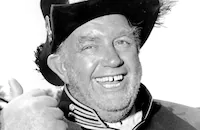
Andy Devine
Roger Imhof
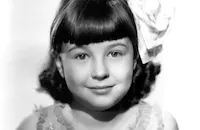
Jane Withers

Margaret Hamilton

Siegfried Rumann

John Qualen
Kitty Kelly
Robert Gleckler

Nick Foran
Frank Melton
Lee Kohlmar
Zeffie Tilbury

J. Farrell Macdonald
Mitchell Lewis
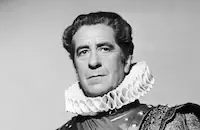
Robert Warwick
Philip Cooper
Robert Adair
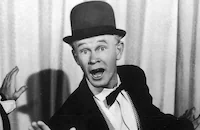
Bill Benedict
Lilyan Irene
Bert Hanlon
Ann Bupp
Crew

Videos
Movie Clip

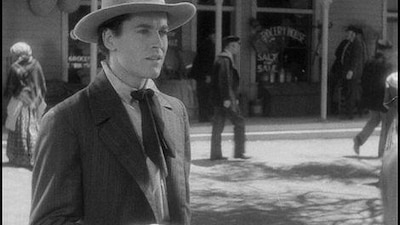

Film Details
Technical Specs

Articles
The Farmer Takes a Wife
The Farmer Takes a Wife originated as a novel called Rome Haul by Walter D. Edmonds published in 1929. In 1934 the book was adapted into the successful Broadway play The Farmer Takes a Wife by Marc Connelly and Frank B. Elser. The play starred Henry Fonda and June Walker.
The Fox Film Corporation (which eventually became 20th Century Fox) bought the rights to the play for Janet Gaynor, one of the studio's most popular actresses at the time. Gaynor was an established Academy Award®-winning star when she agreed to make The Farmer Takes a Wife. The mature role of Molly promised to be a challenging departure from the wholesome ingénue parts she usually played.
Even though Henry Fonda had originated the role of Dan Harrow on Broadway and had received a great deal of critical praise for it, Fox initially didn't want him for the film because he had never appeared onscreen before and was unknown to mass audiences. Instead, the studio pursued such big name movie stars as Gary Cooper and Joel McCrea. It was only when they proved to be unavailable that Fox decided to take a chance on an unknown and gave the role to Henry Fonda. Soon the 30-year-old Fonda, who was under contract at the time to producer Walter Wanger, was on a train bound for Hollywood to make his film debut as a leading man.
Henry Fonda was extremely focused when he arrived on set to begin filming The Farmer Takes a Wife. Costar Janet Gaynor later recalled that, "Cameras and camera angles enthralled him. He studied them and everything else on the set. He was a serious young man and interested in almost everything that happened on the lot. Big red-headed Charlie Bickford was cast as the heavy. He and I would gossip and play practical jokes, but Henry would have none of it." Jane Withers, who plays Della, found Fonda's trepidation endearing. "It was Henry's first picture," she said according to Michael Sragow's 2008 book Victor Fleming: An American Movie Master, "and I was there his first day. He was shaking all over; he was a nervous wreck, and my heart went out to him."
Fonda, who had spent his entire career in stage productions up to that point, soon discovered that acting for the camera was very different. When director Victor Fleming gave him the shooting script to study, Fonda was confused by the presence of what he thought was a new character named "Dolly." In his 1981 autobiography My Life Fonda said, "(It) puzzled the hell out of me. Now I know who the two leads are, Dan and Molly. But suddenly, they've written in a third character. 'Dan and Molly go into the hotel. Dolly with them.' Show you how dumb I was, and I'm serious, I never for the longest time figured out what...Dolly was doing in there. She was always there, but never opened her goddamn mouth!" What Fonda didn't realize at the time was that "Dolly" was a common film industry term for a certain type of camera movement that Fleming wanted to use and wasn't a character at all.
Victor Fleming also had to break Fonda of his stage acting habits, which were too broad for the camera. According to Fonda, Fleming pulled him aside on the first day of shooting. "Hank," he told Fonda, "you're mugging a bit."
"I'm what!" said Fonda, knowing that "mugging" was one of the worst criticisms an actor could get.
"Mugging."
"That's a dirty word."
"I know it is," said Fleming, "and it really isn't your fault. You're playing the farmer the way you did in the theater. You're playing to the back row of the orchestra and the rear row of the balcony. That's stage technique."
Fonda, who wasn't used to acting in films, quickly made adjustments. "That's the biggest message I ever got in Hollywood," he said. "I just pulled it right back to reality because that lens and that microphone are doing all the projection you need. No sense in using too much voice, and you don't need any more expression on your face than you'd use in everyday life...That was the big lesson for me, and I will always bless Victor Fleming for being kind enough to tell me, rather than let me go and have somebody else say it in a review."
Critics had a positive response to The Farmer Takes a Wife, and its success easily catapulted Henry Fonda into instant movie stardom. "A good deal of what delighted us so hugely in the stage version...has found its way into the photoplay," said the New York Times. "...the film still is able to recapture the sentimental warmth and the pungent charm of the most lovable of recent American folk plays...Mr. Fonda, in his film debut, is the bright particular star of the occasion. As the virtuous farm boy, he plays with an immensely winning simplicity which will quickly make him one of our most attractive screen actors."
The New York Herald Tribune said, "Charm and atmospheric color are two qualities that it is difficult for the screen to capture successfully and because The Farmer Takes a Wife manages both of them attractively, it deserves approval as an excellent motion picture...The producers of the film were wise enough to retain Henry Fonda, of the stage cast, in his original role...Mr. Fonda is that rarity of the drama, a young man who can present naïve charm and ingratiating simplicity in a characterization and yet never fail to seem both manly and in possession of his full senses." The New York Sun said, "If The Farmer Takes a Wife is a satisfactory film, then the screen debut of Henry Fonda seems something more than that. Mr. Fonda is a tall, lanky young man with a boyish face, a low voice and a quiet manner particularly effective. One of Mr. Fonda's most outstanding assets is his appearance of sincerity."
The Farmer Takes a Wife was remade in 1953 as a musical starring Dale Robertson and Betty Grable in the leads.
Producer: Winfield R. Sheehan
Director: Victor Fleming
Screenplay: Edwin J. Burke; Marc Connelly, Frank B. Elser (play); Walter D. Edmonds (novel "Rome Haul")
Cinematography: John F. Seitz
Music: Arthur Lange
Film Editing: Harold Schuster
Cast: Janet Gaynor (Molly Larkins), Henry Fonda (Dan Harrow), Charles Bickford (Jotham Klore), Slim Summerville (Fortune Friendly), Jane Withers (Della), Andy Devine (Elmer Otway), Roger Imhof (Sam Weaver), Margaret Hamilton (Lucy Gurget), Siegfried Rumann (Blacksmith), John Qualen (Sol Tinker), Kitty Kelly (Ivy), Robert Gleckler (Freight Agent).
BW-91m.
by Andrea Passafiume

The Farmer Takes a Wife
Quotes
Trivia
Notes
Henry Fonda, who was under personal contract to Walter Wanger, made his screen debut in The Farmer Takes a Wife and reprised the role he had played in the Broadway production. According to modern sources, Fox originally wanted Gary Cooper and then Joel McCrea for the role. Margaret Hamilton also reprised her role from the Broadway production. Hollywood Reporter news items note that Spencer Tracy was originally cast as "Jotham Klore," but was removed from the cast for unspecified reasons in late March 1935. He was reinstated a few days later, but was finally replaced by Charles Bickford soon after filming began when he obtained a release from his contract with Fox. Jane Withers was removed from her part in Redheads on Parade (see below) in order to be in this film. Other Hollywood Reporter news items stated that De Witt Jennings, Charles Grapewin, and Herbert Heywood were to be in the cast, but their participation in the completed picture has not been confirmed. According to the Hollywood Reporter review, the role of "Fortune Friendly" was "originally designed" for Will Rogers, who died in a plane crash on August 15, 1935, thirteen days after the film was released. According to a Hollywood Reporter news item, the shooting of this film was "almost entirely confined to a single comprehensive set, ready in every detail before the picture went into work." The news item noted that producer Winfield Sheehan utilized this same production technique in Way Down East, which also starred Fonda (see below). Twentieth Century-Fox remade The Farmer Takes a Wife as a musical in 1953, under the same title. It was directed by Henry Levin and starred Betty Grable and Dale Robertson.














